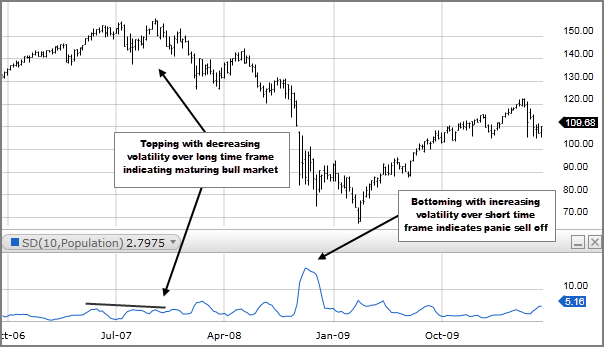stock sell off meaning
A stock market sell-off is a period when the overall stock market drops. Earnings per share EPS Beta.
/BuySellandHoldRatingsofStockAnalysts3-6fc3f5431b974f20bb9585fc61fec4a7.png)
Stock Analysts Buy Sell And Hold Ratings Explained
The meaning of SELL-OFF is a usually sudden sharp decline in security prices accompanied by increased volume of trading.
/dotdash_Final_Making_Money_The_Wyckoff_Way_CSC_DNR_Jul_2020-01-f62425effeb9422fb7ac34ad83c1f963.jpg)
. To sell off things left in stock is to get rid of them usually by selling them at very low prices. For example say that the stock market entered a sell-off. To sell off things left in stock is to get rid of them usually by selling them at very low prices.
How Does a Sell-Off Work. A sell-off occurs when a large volume of securitiesare sold in a short period of time causing the price of a security to fall in rapid succession. Etsy ETSY 051 has become a go-to destination for millions seeking handmade and vintage items among other things.
A stock may drop suddenly in price if its company issues a negative earnings report or if there are reports of a new technology rendering the companys. At 830 tomorrow morning the July jobs report will come out and its almost certainly going to be pretty miserable with headline employment growth of maybe. When they renew their range annually they sell off their end-of-line stock.
To contract for the sale of securities or commodities one expects to own at a later date and at more advantageous terms. A noun or pronoun can be used between sell and off She was forced to sell off all. A market sell-off can occur in any traded asset and may vary in scope.
More people are looking to sell the security than are looking to buy it. Its flagship online marketplace is what its. They also make more.
This is the definition of a market sell-off. What is a Sell-Off. A sudden and marked decline in stock or bond prices resulting from widespread selling.
Instead it is a loose term referring to a period when investors are far more eager to sell than to buy. How to use sell-off in a sentence. Sell-off definition a sudden and marked decline in stock or bond prices resulting from widespread selling.
The operative word here is could as it could also be the first step to more medical and market turmoil For long-term. To dispose of something by selling it especially at reduced prices in order to make money quickly. While it is usually a difficult period for investors traders are relatively immune since they can make money when stocks are moving in either direction.
As more shares are offered than buyers are willing to ac. At a low price to encourage someone to buy it. Put two things togetherand you can even be quite happy about today s sell-off.
When a substantial number of shareholders sell. To betray the trust or faith of. Sell-offs occur for a number of reasons.
When they renew their range annually they sell off their end-of-line stock. During whats called a sell-off a short period of time during which a high volume of securities are sold causing a price drop it can be tempting to sell your. A sell-off would mark the second time that the business has changed hands in two years.
A sell-off is the rapid selling of a security leading to a sharp decline in its price. An act or instance of liquidating assets or subsidiaries. And eventually the stock market could rebound.
This means that the Nasdaq will officially enter the correction territory. Stock sell-offs are a necessary and natural element of a functional marketplace even if they are tough for long-term buy-and-hold investors to swallow. A sale of a business particular assets etc.
The Nasdaq Composite is down nearly 8 and today we could see another 2 sell-off. Sale of securities under pressure.

What Happens When A Stock Is Delisted The Motley Fool

What Does Shorting A Stock Mean The Motley Fool

What Is A Short Squeeze The Motley Fool
:max_bytes(150000):strip_icc()/dotdash_Final_LowVolume_Pullback_Definition_Jun_2020-01-e70fea9e10fb419e8cb21de8f9830fc0.jpg)
Low Volume Pullback Definition
/dotdash_Final_Oversold_Dec_2020-01-83bb8abb9e44484986e604f4bcbacc5a.jpg)
Oversold Definition And Example
:max_bytes(150000):strip_icc()/why-would-company-buyback-its-own-shares_FINAL-dc32eefe564647ce9c66c345230fd0a9.png)
Stock Buybacks Why Do Companies Buy Back Shares

Standard Deviation Indicator Fidelity
/dotdash_Final_Making_Money_The_Wyckoff_Way_CSC_DNR_Jul_2020-01-f62425effeb9422fb7ac34ad83c1f963.jpg)
Wyckoff Method Rules Accumulation And Distribution
:max_bytes(150000):strip_icc()/dotdash_Final_Retracement_vs_Reversal_Whats_the_Difference_Nov_2020-02-8dc13bcc4c4d45b4ac64dbf29d9a7b72.jpg)
Retracement Vs Reversal What S The Difference
/RobinhoodLevel2-9fc2600afd384175b8b6a9af7e37df62.png)
:max_bytes(150000):strip_icc()/dotdash_Final_Blow-Off_Top_Dec_2020-02-05372c150ed64672919762fe22bdc41a.jpg)
:max_bytes(150000):strip_icc()/dotdash_INV-final-Stock-Market-Crash-July-2021-01-88a96c7bec2846dd9986a5777c089417.jpg)
/AStockTicker3-b2e09bfee6254daca63b0374104144fc.png)
/stock-market-crash-sell-off---trading-screen-in-red-104271845-565bca2f055c47558a2d17ec3563a4dd.jpg)
/dotdash_Final_Blow-Off_Top_Dec_2020-01-79b7b9ca1aaa41a98d75d06aa76d947f.jpg)
:max_bytes(150000):strip_icc()/Capitulation12-d3efb4191a234673a04dc23340bb9f7e.png)
/dotdash_INV_final-DistributionStock_Feb_2021-01-326ac37298ee4d26ab010f4dc4274f94.jpg)
:max_bytes(150000):strip_icc()/BuySellandHoldRatingsofStockAnalysts3-6fc3f5431b974f20bb9585fc61fec4a7.png)
